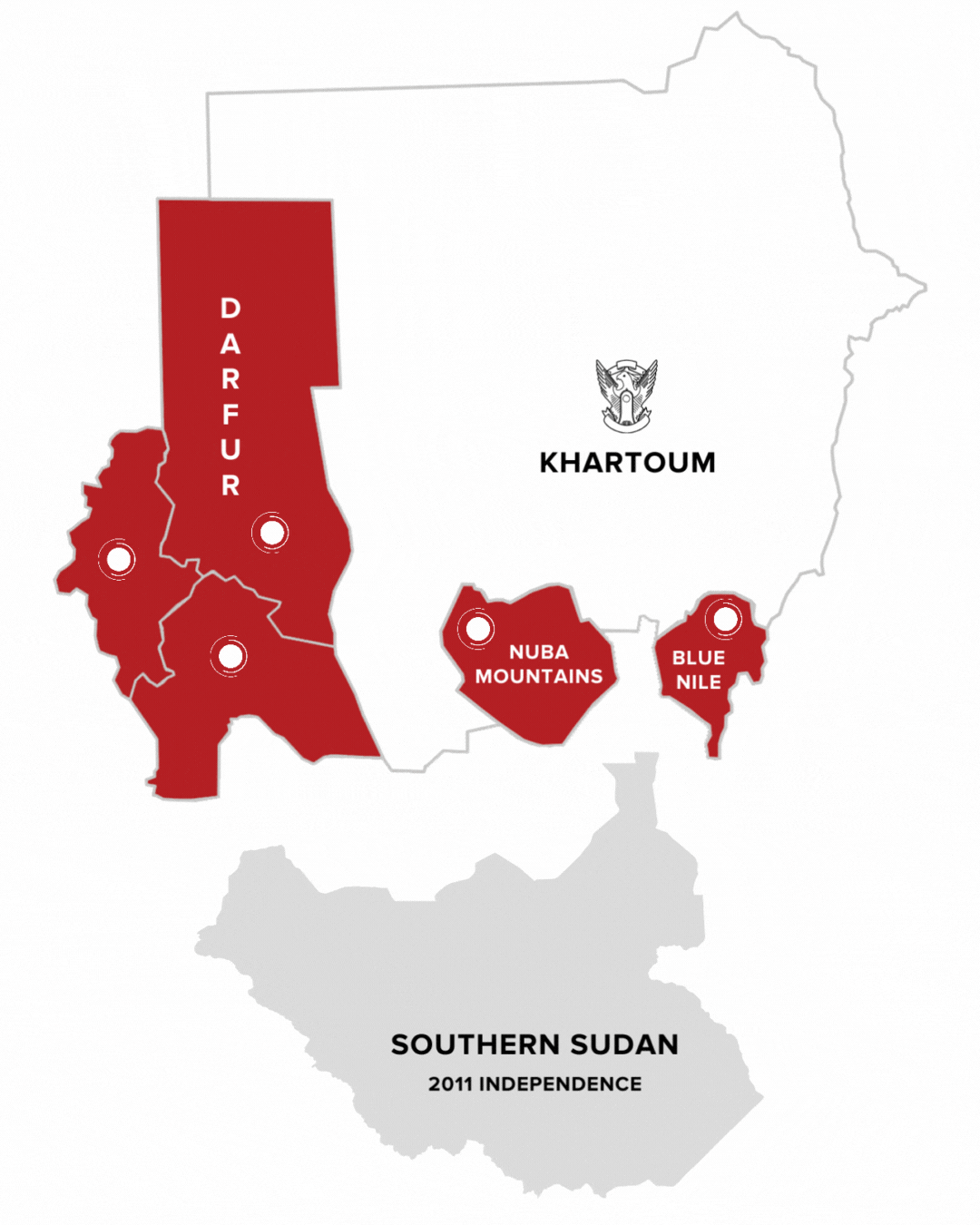
Why Sudan?
49 million people in Sudan are being oppressed by one of the worst military regimes in human history.
That’s roughly 15% of the population of the United States. Or, more than twice the population of Florida. The majority of the Sudanese people live in urban and accessible rural areas, where the most notable signs of governance are the lack of it: the presence of heavily-armed soldiers and little to no basic services.
The most oppressed people call the isolated and war-torn periphery regions of Sudan home. Life in these forgotten areas has often been horrifying. Hundreds of thousands of men, women, and children have been murdered by the regime, with millions more made homeless. But the fires of war are now struggling to stay ahead of the fires of revolution.
How It Began
In 1989, army veteran Omar al-Bashir seized control of the government in a coup.
Wielding a Koran and an AK-47 rifle, he committed his dictatorship to reengineering Sudan into a country dominated by an elite group of Arab tribes underneath a brutal form of Islamic law.
Bashir’s junta has orchestrated systematic campaigns of destruction against all who have stood in their way ever since. The violence continues today, even after Bashir was overthrown by his own military in 2019.
Discover more of Sudan’s recent history in our educational resources, including the role colonialism and other issues played in leading to the rise of this regime.
How Has The Junta Kept Power?
It’s not surprising that this regime is deeply unpopular. Millions of the Sudanese people have peacefully protested or taken up arms to defend their communities. But for years, the generals have run a divide-and-conquer playbook and wielded vast amounts of disinformation to prevent the country from uniting against them.
That strategy is failing today. In 2019, the Sudanese people launched pro-democracy rallies that spread throughout the country. The regime’s brutal crackdown turned nascent calls for change into a full-blown revolution. In a matter of months, Bashir’s own generals removed him from power in a bid to relieve the pressure. A transitional government was soon formed, but the generals staged a coup against civilian leaders in 2021. Protests have remained ongoing ever since.
The regime has long-resisted the will of the Sudanese people through a dark network of corrupt business dealings, oppressive security forces, malign international actors, and nefarious activities that threaten global security. Untangling this web is critical to not only understanding why this regime is still alive, but also how it can be brought to a decisive end.
Genocide & War Crimes
Oppression is common across Sudan, but there is no doubt that ethnic African tribal minorities in the impoverished Darfur, Nuba Mountains, and Blue Nile regions have borne the brunt of this regime’s hatred.
It is in these forgotten places that Sudan’s security forces have murdered, raped, and uprooted millions of people who have called these lands home for centuries. Because of their beliefs, the color of their skin, and so a handful of the regime elite can pillage their natural resources.
Despite the immense pain and suffering these communities have endured, the hope for change in these parts of Sudan is contagious. This hope is rooted in signs of real change. The regime has lost successive wars in the Nuba Mountains and Blue Nile, and fragile ceasefires are holding there today.
Violent Kleptocracy
Regime insiders have hijacked government institutions and overrun the private sector to enrich themselves.
The lucrative oil, gold, and small arms sectors are tied directly to the immense wealth of generals, and their war crimes. Junta paramilitaries seize private land and loot civilian property as part of their paychecks.
Regime generals and their families own over 500 companies and control most economic fields. Regime leaders maintain this power by rewarding family members, favored ethnic groups, international enablers, and their security forces with special economic benefits. Meanwhile, public services dwindle and ordinary people are mired in poverty.
Oppressing Civil Society
Regime security forces openly attack peaceful activists and journalists speaking truth to power. Protesters face tear gas and live ammunition. Agents of the regime frequently raid the homes of civil society leaders.
Many of those who are arrested are imprisoned or brought to dreaded ghost houses, so named because military leaders try to keep them secret. It is here that security forces torture, rape, and execute unarmed citizens. Survivors are tossed back into the streets and left to fend for themselves.
Malign Global Actors
The regime receives financial and military support from several oppressive governments in exchange for access to Sudan’s natural resources and mercenaries. Russia. Libya. Saudi Arabia. The list goes on.
Regime generals have brought in a number of sinister players for decades. The most infamous is the Wagner Group, a Russian paramilitary outfit that extracts gold and other resources across Sudan. Over the years, regime leaders have provided financing, weapons, and safe haven to members of al-Qaeda, the Lord’s Resistance Army, and other terrorist organizations.
Terrorist organizations are also part of the military junta itself. Most notable is the Rapid Support Forces (RSF), a paramilitary group that commits war crimes and other human rights abuses daily. RSF troops have been loaned out as mercenaries in Libya and Yemen, with profits flowing back to the generals.
Religious Persecution
Religious minorities in Sudan are some of the most persecuted in the world. Regime generals have enforced a violent strain of political Islam or looked the other way when extremists persecute religious minorities.
Moderate Muslims, Christians, and animists have all been persecuted in Sudan. Churches have been demolished in major cities and mosques bombed in war-affected areas. Pastors and imams have been arrested and abused. Whether it is in the capital of Khartoum or in more rural and isolated areas, Christians especially are routinely harassed, tortured, and killed by regime security forces.
Poaching & Trafficking
Regime commanders are key players in an elephant poaching network that is spreading chaos across central Africa. Elephants and park rangers have been killed by regime paramilitaries in Cameroon and Chad. Alongside other armed actors like the Lord's Resistance Army, they trade ivory to Sudanese commanders for weapons and money. Illegal ivory is sold in Khartoum to black market buyers in Egypt.
Ammunition produced in Sudan has been found along ivory smuggling routes and in use by armed groups across central Africa. The Rapid Support Forces engage in human trafficking in Sudan, Chad, Libya, and the Central African Republic. The funds from all of these activities bring more wealth to regime officials.
There’s a way to end this madness.
For more than three decades, this atrocious regime has survived economic crises, peaceful protests, sanctions, and armed rebellions. International efforts to change Sudan from the top down have failed. Regime leaders are pariahs in Sudan and abroad, yet most of the generals remain in power. Many people nowadays will say Sudan is a lost cause.
We vehemently disagree. Every time Sudan has taken a step forward, it is because of the Sudanese people. When bombs rained down on communities in the Nuba Mountains, teachers moved their classes to the safety of caves and refugee camps. The doctors and nurses at the only hospital refused to leave. Thousands of ordinary people took up arms to protect their homes. The regime lost the war.
When people across Sudan protested, Bashir was forced out. When the transitional government the Sudanese people fought so hard for was overthrown, a nationwide pro-democracy movement kept the revolution alive. Now the regime’s own hatreds have turned inward, with the generals fighting a new war between themselves.
History tells us change will come when power goes to the Sudanese people. And you can help give it to them.
Operation Broken Silence is building a global movement to empower the Sudanese people through innovative programs as a 501(c)(3) nonprofit organization.
We work diligently to identify local Sudanese community leaders, teachers, and healthcare workers who are already making a difference in the lives of their people. We get to know each other. We hear their triumphs and hardships. What makes them celebrate and what makes them weep. What their dreams are and what they need to get there.
And then the real work begins.
Say hello to one of our partners.
We will see a renewed Sudan in our lifetime.
It won’t happen overnight. But with spreading hope and generous determination in Sudan and around the world, the possibility of a better future is growing. A future in which every man, woman, and child in Sudan thrives.
There is still much work to be done. Will you join us by making a donation to these heroes?
$200: Supports a teacher for one month.
$150: Pays a nurse assistant’s salary for an entire month.
$100: Provides pencils, notebooks, and other basic school supplies for 16 students.
$50: Gives the gift of sport with nets, balls, and more.
The Renewal is our passionate family of monthly givers empowering Sudanese teachers and healthcare workers. Join this generous group of top supporters.
Start an online fundraising page for our Sudanese partners and ask friends and family to donate. The possibilities for your creativity and passion are endless.
Invest in Sudanese heroes with a gift from your portfolio. Your stock donation will ensure that they can continue their life-changing education and healthcare work.











